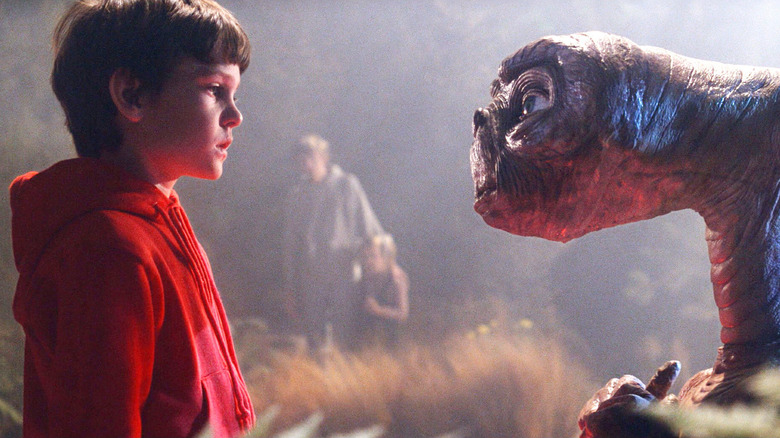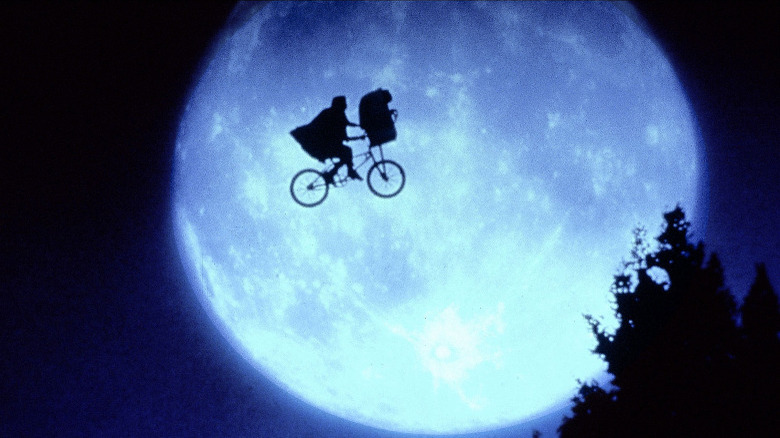Why The E.T. Sequel Never Saw The Light Of Day
A few months after Steven Spielberg's "Jaws" — his first-ever blockbuster — hit theaters in June of 1975, the legendary filmmaker swore off the idea of returning to helm the followup. In John Baxter's "Steven Spielberg: The Unauthorised Biography" Spielberg is quoted as saying, "Making a sequel to anything is just a cheap carny trick." He has, of course, softened his stance on this issue over the years, having since called the shots on multiple "Indiana Jones" movies and 1997's "The Lost World: Jurassic Park." Despite his dismissive attitude, Spielberg even gave serious thought to making an "E.T." sequel, enough so that he and "E.T." writer Melissa Mathison put together a treatment for the 1982 classic titled "E.T. 2: Nocturnal Fears."
According to BirthMoviesDeath's breakdown of the treatment, "Nocturnal Fears" centered on a race of "evil" carnivorous aliens that are "an albino fraction (mutation) of the same civilization E.T. belongs to," and they have been at war with E.T.'s kind for decades when they make their way to Earth in search of a stranded being named Zrek. Upon being alerted to their presence thanks to the Speak-N-Spell communication device that E.T. built, Elliott, his sister Gertie, and their older brother Michael set out to the redwood forest near their home in California, believing their old pal E.T. is back. Instead, they end up being captured and tortured for information by these not-so-friendly other-worldly visitors, leaving it to Elliott's mother Mary, the government agent "Keys" (who's now dating Mary), and, of course, E.T. himself to rescue them.
You Can Never Phone Home Again
Why didn't "E.T. 2: Nocturnal Fears" happen? Well, as BMD recounted, Spielberg ultimately decided that making a sequel would rob "E.T." of its "virginity" and left it at that. Setting aside the discussion about how virginity is a problematic social construct (which it is), I think I can see what Spielberg and Mathison were initially going for with "Nocturnal Fears" based on this excerpt from their treatment:
Keys has told his story time and time again about his first meeting with the tiny, confused E.T. It is a story full of emotion, surprise and mystery. Keys never plays down how important that experience was to the direction his life took from then on. Keys admits his life ambitions were channeled toward more positive and rewarding goals. He didn't continue to live in a dream-world of hope that he would one day meet his space friend again, like he fears Elliot and his friends are now.
Where "E.T." was a parable about childhood that drew heavy inspiration from Spielberg's own upbringing, it seems as though Spielberg and Mathison wanted to use "Nocturnal Fears" to explore how part of growing up means learning that the world is not only more complex and dangerous than you realized as a kid, but also that your hopes and dreams don't always pan out the way you want. This would account for the darker and otherwise downbeat plot that the pair came up with here.
That being said, it's probably for the best this sequel never came to pass. "E.T." is less a sci-fi film and more a fairytale movie disguised as a sci-fi film (heck, the main character basically has magic powers that allow him to heal plants and make objects fly), its world was only really designed to tell a specific story and might've buckled under the weight of the heavier themes alluded to in the treatment for "Nocturnal Fears." Instead, Spielberg would go on to explore similar ideas nearly 20 years after "E.T." with 2001's "A.I. Artificial Intelligence," another sci-fi movie with fairytale elements that was better equipped to handle such gloomy subject matter.

